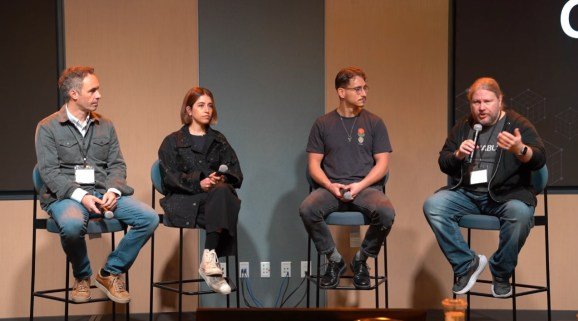[ad_1]
VentureBeat presents: AI Unleashed – An exclusive executive event for enterprise data leaders. Network and learn with industry peers. Learn More
After the White House released its long-awaited, 100+ page Executive Order on “Safe, Secure, and Trustworthy” AI yesterday — and my inbox practically exploded with offers of post-game analysis — I asked Merve Hickok, president of the independent nonprofit Center for AI and Digital Policy, about its timing. After all, the AI Executive Order came just two days before Vice President Kamala Harris crosses the pond to attend the highly-anticipated UK AI Safety Summit; the same day the G7 introduced a voluntary AI code of conduct; and just as the final negotiations around the EU AI Act are in “touching distance” of the finish line.
Hickok laughed and said that she and her colleagues have begun to call this week the “World Cup” of AI policy. “There are multiple big-ticket happenings this week, so if you’re involved in those ‘World Cup’ conversations, it’s keeping you busy.”
AI policy is no game, of course — but there is no doubt that there is stiff competition to show global leadership on AI regulation. The question is, will the USA win? And can it attract the talent equivalent of soccer/football superstars Cristiano Ronaldo or Lionel Messi to do it?
According to Hickok, the answer is yes — and, she added, “we should.” The US, she explained, needs “models based on human rights and democratic values.” That has always been the expectation from the US, she added, but pointed out that it has been lacking — something she said she called out in her congressional testimony.
Event
AI Unleashed
An exclusive invite-only evening of insights and networking, designed for senior enterprise executives overseeing data stacks and strategies.
“Therefore, it’s great to see us now making human rights and democratic values a guiding north star,” she said about Biden’s AI Executive Order “That’s what we need in global AI governance. This is not a national thing. AI does not sit within borders.”
US positioning itself as global AI policy leader
While not everyone might agree with Hickok’s point of view on US priorities for AI regulation, others told me that there is no doubt the US is clearly positioning itself to lead in global AI policy.
“Today’s Executive Order signals the Biden Administration’s determination to translate policy into practice now and to play a leadership role in AI governance globally,” said Caitlin Fennessy, vice president and chief knowledge officer of the International Association of Privacy Professionals (IAPP).
Florian Douetteau, co-founder and CEO of AI unicorn Dataiku, said in an email that while the EU leans towards stricter AI regulation, the US is striking a balance between innovation and responsible usage. “This approach not only ensures the safe and ethical development of AI, but also positions the US as a leader in the global AI arena, fostering innovation while safeguarding public interests,” he said.
And Aya Ibrahim, former senior advisor to the director of the White House Office of Science and Technology Policy, pointed out that “global leadership on AI begins with the US getting its own house in order first, and this executive order is a major step in that direction.”
Other countries ‘gaining on us’
On the AI policy front, Team USA is also notably concerned with maintaining its technology innovation lead as other countries — particularly China (For example, the Biden administration announced two weeks ago that it is reducing the types of semiconductors that American companies will be able to sell to China).
Even Senate Majority Chuck Schumer (D-NY) is feeling the need for World Cup-level speed. President Biden’s AI Executive Order, he said in a statement yesterday, is a “crucial step” to ensure that the US remains the leader of AI innovation and “can harness this awesome technology for good.”
“This is a massive step forward, but of course more is needed. All executive orders are limited in what they can do, so it is now on Congress to augment, expand, and cement this massive start with legislation,” he said. “Congress must now act with urgency and humility. Urgency, because we can’t wait while other countries are gaining on us and humility because the task of ensuring sustained investment to advance AI innovation and setting common-sense guardrails is a powerful and challenging one.”
Not surprisingly, however, some policy-watchers have a completely different take on the ‘World Cup’ of AI policy — that the AI Executive Order will make US global AI leadership goals even more difficult.
Adam Thierer, a senior fellow for the R Street Institute’s technology and innovation team, said that the EO — and the Biden Administration’s negotiations with the UK at the AI Safety Summit — is “shooting ourselves in the foot as the race gets underway,”
“While some will appreciate the whole-of-government approach to AI required by the order, if taken too far, unilateral and heavy-handed administrative meddling in AI markets could undermine America’s global competitiveness and even the nation’s geopolitical security,” Thierer wrote in a blog post. “Excessive preemptive regulation of AI systems could impede the growth of these technologies or limit their potential in various ways.”
To win the World Cup of AI policy, be a goldfish
The truth is, winning the World Cup of AI policy won’t be an easy feat. Just look at the AI Executive Order: The New York Times quoted Sarah Kreps, a professor at the Tech Policy Institute at Cornell University, as saying that any of the directives in the order will be difficult to carry out, including rapid hiring of AI experts in government and passing legislation. “It’s calling for a lot of action that’s not likely to receive a response,” Ms. Kreps said.
But while mistakes may be made along the way, it will be important not to linger on them and move on to the next AI policy challenge. As Ted Lasso would say, “be a goldfish” — and if AI leaders need some feedback on policy as they vie for the World Cup of AI Policy, there’s always an emergency meeting of the Diamond Dogs.
VentureBeat’s mission is to be a digital town square for technical decision-makers to gain knowledge about transformative enterprise technology and transact. Discover our Briefings.
[ad_2]
Source link



